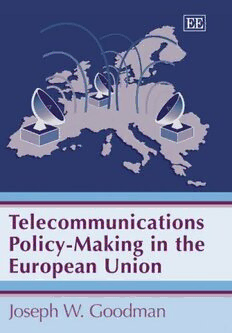Download Telecommunications Policy-making in the European Union PDF Free - Full Version
Download Telecommunications Policy-making in the European Union by Joseph W. Goodman in PDF format completely FREE. No registration required, no payment needed. Get instant access to this valuable resource on PDFdrive.to!
About Telecommunications Policy-making in the European Union
Examining the emergence of a European Union telecommunications policy, Joseph Goodman explains how and why the policy developed as it did and why certain reforms in the sector were easier to achieve than others. He provides a history of the key actors in the policy-making process from the first attempts by the national postal, telegraph, and telecommunication administrations to coordinate their telecommunications policies in the 1950s, to the implementation of a comprehensive EU telecommunications regulatory structure in 1998 and the development of a new regulatory structure in 2003. The analytical framework employed by the author draws upon new institutionalism and actor-based approaches, providing an opportunity to evaluate the utility of a synthetic approach for examining and explaining EU policy-making. The focus of his analysis is on the European Commission’s two-pronged strategy of liberalization and harmonization, which began in the late 1980s and culminated in an important milestone on January 1st 1998, when the EU Member States fully opened their telecommunications markets to competition. He concludes that a synthetic approach, which enables the researcher to apply a number of approaches to multiple settings and various levels of analysis, is useful – even necessary – in understanding and explaining the many dimensions of EU policy-making. This authoritative study will be of interest to all those in the telecommunications industry – including attorneys, consultants, and lobbyists - who would like to know how the EU’s policy developed. It will appeal, more generally, to political scientists and scholars of European history and politics.
Detailed Information
| Author: | Joseph W. Goodman |
|---|---|
| Publication Year: | 2006 |
| ISBN: | 9781847201690 |
| Pages: | 317 |
| Language: | English |
| File Size: | 1.193 |
| Format: | |
| Price: | FREE |
Safe & Secure Download - No registration required
Why Choose PDFdrive for Your Free Telecommunications Policy-making in the European Union Download?
- 100% Free: No hidden fees or subscriptions required for one book every day.
- No Registration: Immediate access is available without creating accounts for one book every day.
- Safe and Secure: Clean downloads without malware or viruses
- Multiple Formats: PDF, MOBI, Mpub,... optimized for all devices
- Educational Resource: Supporting knowledge sharing and learning
Frequently Asked Questions
Is it really free to download Telecommunications Policy-making in the European Union PDF?
Yes, on https://PDFdrive.to you can download Telecommunications Policy-making in the European Union by Joseph W. Goodman completely free. We don't require any payment, subscription, or registration to access this PDF file. For 3 books every day.
How can I read Telecommunications Policy-making in the European Union on my mobile device?
After downloading Telecommunications Policy-making in the European Union PDF, you can open it with any PDF reader app on your phone or tablet. We recommend using Adobe Acrobat Reader, Apple Books, or Google Play Books for the best reading experience.
Is this the full version of Telecommunications Policy-making in the European Union?
Yes, this is the complete PDF version of Telecommunications Policy-making in the European Union by Joseph W. Goodman. You will be able to read the entire content as in the printed version without missing any pages.
Is it legal to download Telecommunications Policy-making in the European Union PDF for free?
https://PDFdrive.to provides links to free educational resources available online. We do not store any files on our servers. Please be aware of copyright laws in your country before downloading.
The materials shared are intended for research, educational, and personal use in accordance with fair use principles.

